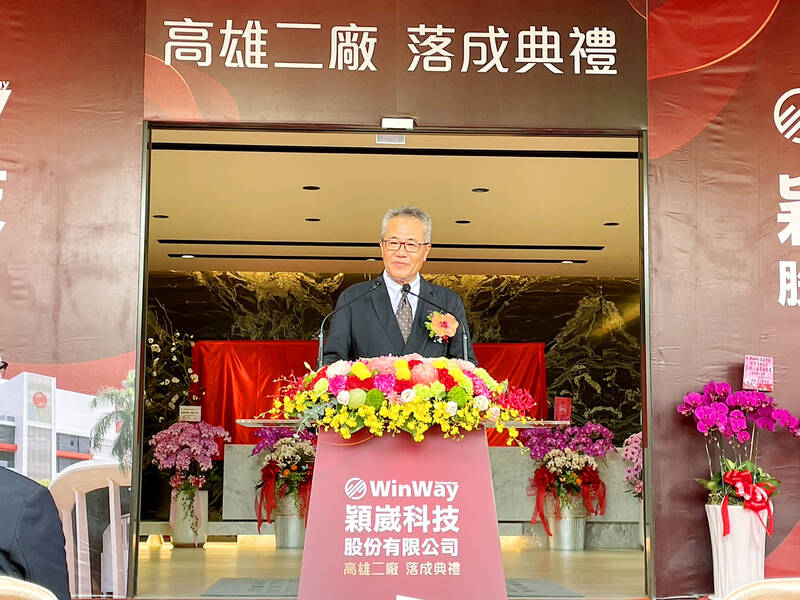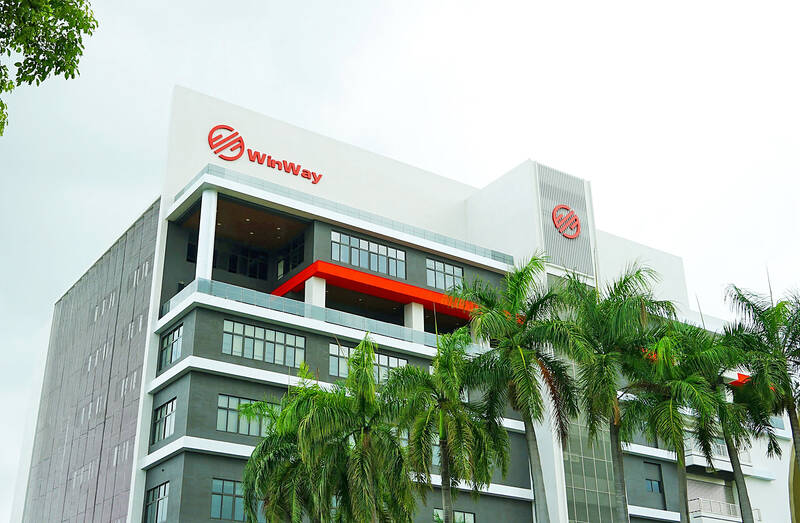WinWay Technology Co (穎崴) yesterday launched a new probe card factory in Kaohsiung which the IC testing interface supplier has spent NT$3.2 billion (US$104.17 million) on, as it seeks to expand capacity amid fast-growing testing demand primarily for artificial intelligence (AI), high-performance-computing (HPC) and auto chips.
The new factory would help satisfy customers’ demand for advanced process technologies, as well as high-speed and high-frequency testing services, the company said in a statement.
It is expected to generate an annual production value of NT$1 billion and create about 1,000 jobs in the nation’s second-largest city, WinWay said.

Photo: CNA
“The company decided to invest NT$3.25 billion on building a high-end semiconductor manufacturing facility at the Nanzih Technology Industrial Park (楠梓科技產業園區), as it believes rapid growth of 5G, AI, HPC and auto chips will give a strong boost to high-end testing services,” WinWay chairman Mark Wang (王嘉煌) said in the statement.
With the factory entering operations, WinWay aims to expand its probe card capacity to 3 million units a month within the next two years, which would raise its in-house probe card supply to 50 percent of total probes consumed by the firm.
The expansion of probe card capacity would enable the company to be well-prepared for growth opportunities from AI-related chips, Wang said.

Photo courtesy of the Kaohsiung Economic Development Bureau via CNA
Due to rapidly growing demand for generative AI applications, the production value of the global semiconductor industry would triple to US$125 billion in 2027, from US$53 billion this year, Morgan Stanley said in a report earlier this week.
WinWay counts AI chip suppliers Advanced Micro Devices Inc (AMD) and Nvidia Corp among its customers.
AMD yesterday launched its new MI300X chip for AI and is targeting mass production in the fourth quarter of this year.
WinWay is also expanding its probe card capacity at a facility in Hsinchu, Wang said, adding that it is expected to be completed by the end of this year.
WinWay expects its probe card revenue to double next year, thanks to the capacity expansion at its Kaohsiung and Hsinchu facilities, Wang said.
The company’s probe card business accounted for about 20 percent of its total revenue last year, company data showed.
WinWay’s revenue in the first five months totaled NT$1.64 billion, up 26.68 percent from the same period last year.
This year’s revenue is expected to be higher than last year’s NT$5.12 billion, fueled by new orders and a broader product lineup, the company said.

Taiwan Semiconductor Manufacturing Co (TSMC, 台積電) secured a record 70.2 percent share of the global foundry business in the second quarter, up from 67.6 percent the previous quarter, and continued widening its lead over second-placed Samsung Electronics Co, TrendForce Corp (集邦科技) said on Monday. TSMC posted US$30.24 billion in sales in the April-to-June period, up 18.5 percent from the previous quarter, driven by major smartphone customers entering their ramp-up cycle and robust demand for artificial intelligence chips, laptops and PCs, which boosted wafer shipments and average selling prices, TrendForce said in a report. Samsung’s sales also grew in the second quarter, up

On Tuesday, US President Donald Trump weighed in on a pressing national issue: The rebranding of a restaurant chain. Last week, Cracker Barrel, a Tennessee company whose nationwide locations lean heavily on a cozy, old-timey aesthetic — “rocking chairs on the porch, a warm fire in the hearth, peg games on the table” — announced it was updating its logo. Uncle Herschel, the man who once appeared next to the letters with a barrel, was gone. It sparked ire on the right, with Donald Trump Jr leading a charge against the rebranding: “WTF is wrong with Cracker Barrel?!” Later, Trump Sr weighed

LIMITED IMPACT: Investor confidence was likely sustained by its relatively small exposure to the Chinese market, as only less advanced chips are made in Nanjing Taiwan Semiconductor Manufacturing Co (TSMC, 台積電) saw its stock price close steady yesterday in a sign that the loss of the validated end user (VEU) status for its Nanjing, China, fab should have a mild impact on the world’s biggest contract chipmaker financially and technologically. Media reports about the waiver loss sent TSMC down 1.29 percent during the early trading session yesterday, but the stock soon regained strength and ended at NT$1,160, unchanged from Tuesday. Investors’ confidence in TSMC was likely built on its relatively small exposure to the Chinese market, as Chinese customers contributed about 9 percent to TSMC’s revenue last

LOOPHOLES: The move is to end a break that was aiding foreign producers without any similar benefit for US manufacturers, the US Department of Commerce said US President Donald Trump’s administration would make it harder for Samsung Electronics Co and SK Hynix Inc to ship critical equipment to their chipmaking operations in China, dealing a potential blow to the companies’ production in the world’s largest semiconductor market. The US Department of Commerce in a notice published on Friday said that it was revoking waivers for Samsung and SK Hynix to use US technologies in their Chinese operations. The companies had been operating in China under regulations that allow them to import chipmaking equipment without applying for a new license each time. The move would revise what is known